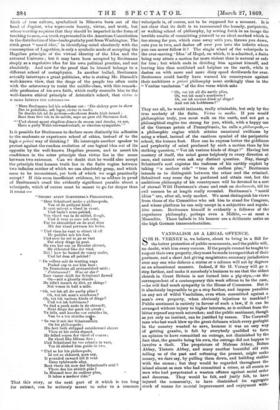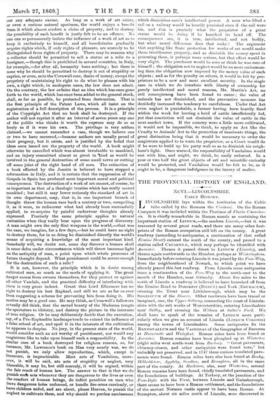'WANDA LTSM AS A LEGAL OFFENCE.
SIR H. VERNEY is, we believe, about to bring in a Bill for the better protection of public monuments, and the public will, no doubt, wish him every success. If the people cannot be taught to respect their own property, theymust be made to respect that of their partners, and a short Act giving magistrates summary jurisdiction over any one who defaces a statue or a column will act by degrees as an educational measure. Indeed, if Sir H. Verney will go a. step farther, and make it somebody's business to see that the oldest church in Great Britain is not turned into a pig-stye,—as the correspondent of a contemporary this week affirms to be the case, —he will find much sympathy in the House of Commons. But is it absolutely impossible to go a step farther, and impose penalties on any act of wilful Vandalism, even when committed against a man's own property, when obviously injurious to mankind? Public sentiment is entirely in favour of such a law, if it can be arranged without injury to higher interests, as is evident from the bitter reproof anysuch actevokes; and the public sentiment, though as yet only an instinct, can be justified by reason. The Cornwall man who last week blew up the great dolmaen which every geologist in the country wanted to save, because it was an easy way of getting granite, is felt by everybody qualified to forra an opinion to have committed an outrage, not diminished by the fact that, the granite being his own, the outrage did not happen to. involve a theft. The proprietors of Melrose Abbey, Bolton. Abbey, Tintern Abbey, and many another beautiful old ruin telling us of the past and softening the present, might make money, we dare say, by pulling them down, and building stables with the stones ; but they would be regarded throughout the island almost as men who had committed a crime, at all events as men who had perpetrated a wanton offence against social order and decorum. They would be felt, and justly felt, to have injured the community, to have diminished its aggreete stock of means for mental improvement and enjoyment with
out any adequate excuse. As long as a work of art exists, or even a curious natural specimen, the world enjoys a benefit from it which almost confers a claim of property, and to destroy the possibility of such benefit is justly felt to be an offence. No one can so permanently isolate the influence of a work of art as to keep it exclusively to himself, and all beneficiaries gradually acquire rights which, if only rights of pleasure, are scarcely to be distinguished from rights of property. There may be reasons why a collector should be permitted to sell a statue or a relic to a foreigner,—though this is prohibited in several countries, in Italy, for example,—for after all, humanity loses nothing ; but there is none why he should be permitted to destroy it out of stupidity or caprice, or even, as in the Cornwall case, desire of money, except the propriety of maintaining his right to do what he pleases with his own, a right which, in analogous cases, the law does not admit. On the contrary, the law ordains that an idea which has once gone forth to the world, which has once been added to the general stock, shall, so far as possible, be protected from destruction. That is the first principle of the Patent Laws, which all insist on the registration of a full description of the process. It is a principle of the Copyright Act that no book shall be destroyed. If the author will not reprint it after an interval of seven years any one of the public who thinks it worth the expense may do so as freely as if it were his own. The privilege is very seldom claimed,—we cannot remember a case, though we believe one or two to have occurred,—because authors are usually proud of their progeny, but it exists, and is justified by the belief that ideas once issued are the property of the world. A book might otherwise be cancelled which was almost invaluable to mankind, and an injury committed almost as great in wind as would be involved in the general destruction of some small nerve or cutting off some joint of the right hand of all men. The extinction of a book effected by the Jesuits is believed to have stopped a reformation in Italy, and it is certain that the suppression of the Gospels in Spain has produced most important moral and political consequences. The destruction of a work of art cannot, of course, be as important as that of a theologic treatise which has really moved mankind ; but still it may lower seriously the standard of art in its own department, may, that is, in one important branch of thought throw the human race back a century or two, compelling it, as it were, to rediscover what had already been successfully applied, to re-acquire by painful endeavour thoughts already expressed. Precisely the same principle applies to natural curiosities when they really bear upon the progress of discovery. A man might own the only flint weapons in the world,—that was the case, we imagine, for a few days,—but he could have no right to destroy them, for in so doing he diminished directly the world's means of acquiring a knowledge of the most important kind. Somebody will, we doubt not, some day discover a human skull in some delta under circumstances which will throw immense light on the antiquity of man, a point upon which whole processes of future thought depend. What punishment could be severe enough for the destruction of such a relic?
It is not, however, the principle which is in doubt among cultivated men, so much as the mode of applying it. The great danger cornea from owners themselves, for they protect us against all other Vandals, and the practical difficulty of interfering with them is very great indeed. Grant that Lord Ellesmere has no right to destroy his best Raphael, and still we are as far as ever from suggesting a scheme for preventing him from doing it. His motive may be a good one. He may think, as Cromwell's followers actually did think, that the sacred beauty of the Madonna tempts the spectators to idolatry, and destroy the picture in the interests of true religion. Or he may deliberately decide that the execution, say, of a Pre-Raphaelite landscape tends to extend the influence of a false school of art, and spoil it in the interests of the cultivation he appears to despise. No jury, in the present state of the world, would consider such an act worthy of punishment, nor would any magistrate like to take upon himself such a responsibility. In the similar case of a book destroyed for religious reasons, as, for instance, Mr. Lawrence's book on Man very nearly was, we do not punish, we only allow reproduction, which, except in literature, is impracticable. Most acts of Vandalism, moreover, it will be said, are acts of stupidity or neglect, very blamable, it may be, but still scarcely, it will be argued, within the fair reach of human law. The answer to that is that we do Punish suet seta whenever they are dangerous to the lives or even the comfort of human beings, do inflict penalties on men who leave dangerous holes unfenced, or handle fire-arms carelessly, or leave children unfed, and are about, please Heaven, to punish the neglect to cultivate them, and why should we pardon carelessness which diminishes men's intellectual power. A man who lifted a rail on a railway would be heavily punished even if the rail were his, and this is precisely what the proprietor of a great statue would be doing if he knocked its head off. The consequences are, it is true, intellectual, and not bodily, but what moral difference does that make ? The argument that anything like State protection for works of art would make them troublesome property, and so diminish the money spent in procuring them, is perhaps more serious, but that effect would be very slight. The purchaser would be sure or think he was sure of himself ; the obligation not to neglect would be no more embarrassing than the obligation now imposed by the money value of such objects; and as for the penalty on others, it would be felt by proprietors to be a new and most excellent security. In the single ease in which we do interfere with liberty of ownership for purely intellectual and moral reasons, Mr. Martin's Act, no evil consequence g have been found to ensue ; the value of animals has not diminished, and the preventive measure Wan decidedly increased the tendency to carefulness. Under that Act even neglect is punishable, a farmer having been heavily fined within the week for leaving a herd of cattle insufficiently fed, yet that conviction will not diminish the value of cattle in the next market town. If the country were a little more cultivated, it would not be impossible, we think, to apply an Act like the Cruelty to Animals' Act to the protection of inanimate things, the great distinction being that it would be necessary to order the magistrate applied to to warn the proprietor, as a Court would do if he were to build up his party wall so as to diminish his neighbour's light. Once warned, the responsibility of Vandalism would rest with him, and might, we think, be easily enforced. In a year or two half the great objects of art and scientific curiosity would be protected, and Vandalism would befelt to be, as it ought to be, a dangerous indulgence in the luxury of malice.



































 Previous page
Previous page